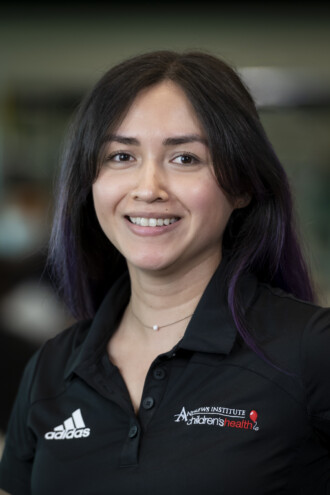The end of the year is a time for holiday parties, family gatherings, and plenty of celebratory feasting. But it’s also a time fraught with unhealthy messages surrounding diet and health. From joking with coworkers about “earning” that office banquet to commercials about New Year’s resolutions and an aunt commenting on your weight at Christmas dinner, it can have a serious impact on your physical and mental wellbeing.
“The holiday season really starts with Halloween, if we’re talking about food,” says Gabbie Ricky, a dietician at Children’s Health Andrews Institute Sports Performance. “There’s a lot of positive marketing toward all the holiday foods and flavors, but then there’s always this underlying fear of falling off the wagon over the holiday season or falling off track.”
All that end-of-year eating can lead people to “push off” healthy habits and goals until the new year, Ricky says, which only feeds the guilt you feel during the holiday season itself. It’s cyclical, she says, and it’s a toxic approach to health.
“I think a lot of people struggle with the ‘all or nothing’ mindset. With their health, healthy eating, fitness, it’s either they’re all in or they’re not in at all,” she says. “So, a healthy way to reframe that that I like to encourage is instead of ‘all or nothing,’ ‘all or something.’”
We talked to Ricky about navigating food and diet culture during the holidays, its dangers, and how to combat it.
This interview has been edited for length and clarity.
What’s one thing about holiday diet culture that people might not expect?
The marketing has gotten sneakier. I feel like diet culture is just more deeply embedded into things that we might not think about. And it’s talked about under the guise of “wellness.”
Can you talk about how that marketing has gotten sneakier?
Food systems or food programs that label themselves as a lifestyle program. Not a diet, but then they do have a “good” and “bad” list of foods—that’s a red flag, in my opinion. Or a tiered system of ranking foods, like a red food, a yellow food, and a green food. Anything that sorts foods into buckets of good and bad is, in my opinion as a dietitian, is not healthy.

And why is that?
I’ve seen it create a lot of food fear, a lot of anxiety around food. People develop very disordered eating habits that just affect their overall quality of life and their mental health and mental wellbeing because they’re stressed about, “is this a green food? Or is this a yellow food?” Or, “oh, no, that’s bad. I can’t eat that.” But then they see everybody else enjoying themselves eating that. And then they start to feel a little bit guilty or maybe a little bit ashamed.
How do conversations around eating during the holidays lead to guilt?
Those types of unwanted comments about food and body size and shape, specifically—that can come up in a lot of ways, which I’m sure we’ve probably all experienced on our own. Or maybe we’ve contributed to it without knowing just because that’s how it is. Comments like “Is that all you’re eating?” or “You’re going back for more?” … Or you see a family member or a friend you haven’t seen in a long time, and it’s like, “Oh, you look really good, did you lose weight?” Like equating being in a smaller body to looking good. When in reality, we don’t know why they’re the size that they are.
“Definitely don’t starve yourself just because you’re anticipating to eat a big meal later in the day.”
Gabbie Ricky
What advice would you give someone dealing with these harmful comments?
Sometimes the best thing you can do is to just literally remove yourself from the situation. You don’t need to have a response. Whether it’s directed at you or not, just leave that situation and join another conversation, a better one. And then, also, you can set some healthy boundaries with that person if you feel comfortable. Liiterally you can tell them, “I’m not comfortable talking to you this.” Just saying that, and if they don’t respect it, then you can remove yourself from the situation.
How does disordered eating manifest during the holidays and then post-holidays?
It shows up in feeling like you have to earn the food or burn it off. And then also physically restricting yourself, like only allowing a tiny sliver of something, and then measuring out your food, weighing your Thanksgiving meal, being so strict that it’s just impeding on your experience.
Obviously, all those things are bad. But why?
A lot of times people will, kind of “yo-yo” diet, or go back and forth from periods of over-restricting to overeating, right? But that has damaging effects to your physical health. There’s evidence that after over-restricting—or just really forced starving, because you’re not eating enough—your body can hold on to fat a little bit more. Then it just feeds into this cycle of feeling like you have to work that off by over-restricting or over-exercising. And then, because you feel restricted, you give into the temptation of having the foods that you enjoy again, and then you overdo it because you over-restricted.
What advice would you give for healthy holiday season eating behaviors?
Definitely don’t starve yourself just because you’re anticipating to eat a big meal later in the day. It’s counterintuitive. So again, eat something with protein and fiber. For breakfast, eat something with protein, and fiber for lunch, and then fully allow yourself to enjoy that dinner. And then move on. There’s really no secret. I guess the key here in the holiday season is don’t do anything drastic. Whether it’s like drastically going on a fad diet or drastically overeating and binging everything, just try to stay on a cycle. And humans are creatures of habit. Our bodies are the same way. And if we can feed it at regular intervals, and fully allow yourself to enjoy the foods, you’ll be better off.
How can people unlearn those habits and that culture?
You can start with food neutrality, which literally is just removing that morality that society has put over food. And by that, I just mean no food is good. No food is bad. Unless you’re clinically allergic to it, then, of course, it’s bad. But, just learning to remove those two words from your vocabulary when you’re describing food is extremely powerful in the shift that it can create in your mind.
How do you start to shift that mindset to food neutrality?
In your eating habits, allow yourself to reincorporate those foods that maybe you thought were bad. Just the habit of you getting into them again or allowing yourself to eat them again. And then the way that you think about it, that’s a lot already for some people, just depending on how deep these disordered thoughts and patterns are. So yeah, just allowing yourself to incorporate those foods into your life. Foods that you once thought were bad.
Are there things about diet culture during the holidays or after during New Year’s I haven’t asked?
I feel like we’ve touched on it on this already, but just like understanding that in health, wellness, diet, fitness, none of those things are one size fits all. So just being cognizant of that. And if you’ve had success with something, [not] trying to push that on somebody else, or just understanding that and embracing that, really, all of this should be very individualized to the person.
Get the AtHome Newsletter
Author






